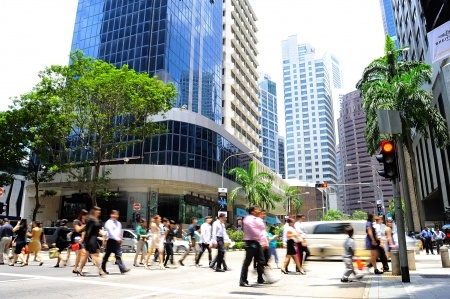26 March, 2016
In this article, we examine share buybacks, for which a mandate will be sought by many of Singapore’s listed companies from shareholders this year. Share buybacks may play a role of increased importance as continued weakness in the stock market is met with increasing protests from management that selling is overdone and shares are undervalued.
Share buybacks – increasing in favour
Fears over global growth and strong risk aversion have, unfortunately, prevailed for much of this first quarter of the year. Singapore’s market barometer, the Straits Times Index, has declined by 17% over the past 12 months. Several stocks have even been trading at below book value.
It is therefore perhaps unsurprising that Singapore’s listed companies bought back S$2 billion worth of shares on the SGX in 2015, almost double the activity during the financial crisis of 2008 of S$1.071 billion. In particular, our local banks have been buying heavily – the Straits Times reported that UOB spent S$12.7 million, DBS spent S$8.2 million, and OCBC spent S$6.5 million, on share buybacks last December.
Why buy back shares?
Great bargain, less dilution
One of the reasons oft-cited for a share buyback is that the shares are undervalued. Repurchasing shares at a low cost and reissuing them later when the price has risen should allow a company to raise more funds, with less dilution to shareholders.
In the current climate, this argument is likely to be more appealing than ever.
Treasury shares –
Further, under Singapore law, there can be specific advantages to repurchased shares. The SGX Listing Rules and the Singapore Companies Act allow companies to buy back shares representing up to 10% of a company’s share capital, and to hold those shares in treasury instead of cancelling them.
quickly accessed,
Treasury shares can be accessed more quickly in a subsequent equity fund-raising exercise, as treasury shares are not subject to fresh shareholders’ approval for use. Furthermore, if the shares were once listed, they “retain” the approval for listing and quotation by SGX, and are not subject to the application process again, also a time-saver.
additional “ammunition”
Treasury shares effectively increase the number of shares that may be used by the company in equity fundraising activities without having to first obtain shareholders’ approval. The process of seeking shareholders’ approval may take up to a few months – factoring in time to prepare documents, obtain regulatory clearance, print and dispatch documents to shareholders, as well as the notice period required for holding the shareholders’ general meeting.
SGX’s listing rules do mitigate these time costs to some extent. SGX Mainboard companies can seek general share mandates to issue up to 50% of their issued shares, excluding treasury shares, while SGX Catalist companies can seek general mandates to issue up to 100% of their issued shares, excluding treasury shares, every year. In Singapore, many issuers propose, and are granted, these general share mandates at their annual general meetings, without much comment.
Treasury shares “add on” to the fund-raising potential as exercises involving treasury shares are typically treated as transfers rather than new issues of shares, and are therefore not subject to the above-mentioned limits.
In other words, a Catalist company could potentially use 110% of its total number of issued shares (excluding treasury shares) in equity fundraising exercises, provided that it had shareholders’ approval for a general share mandate and a share buyback mandate.
Reduce cost of equity financing
Other benefits associated with share buybacks include reducing the cost of equity capital (i.e. dividends) when that funding is not or is no longer required.
Increase shareholding stakes – without triggering general offer obligations
Of course, share buybacks result in shareholders owning a greater proportion of the company (and a correspondingly greater proportion of the company’s voting rights and earnings). Perhaps in recognition of the prevalence of share buyback activity amongst Singapore companies, the Securities Industry Council of Singapore (the “Council”) issued a practice statement in 2012 on exemptions in connection with share buybacks. A director whose shareholding might increase beyond prescribed limits due to the company buying back shares, and who might thereby require an exemption from the mandatory general offer obligation, is only required to submit a confirmation form to the Council after shareholders’ approval of the share buyback mandate is obtained, instead of obtaining approval beforehand.
Better financial metrics
Share buybacks tend to push up share prices due to demand and supply forces, and key financial metrics such as earnings per- share (EPS) should thereby also improve.
Certain commentators have suggested that share buybacks may in reality be motivated by the desire to offset dilution caused by the exercise of employee share options or to increase the value of executive remuneration packages linked to financial ratios. However, the recent share purchases made by executives themselves may provide reassurance that the real driver is in fact in recapturing value. Jamie Dimon’s purchase of US$26.6 million of JP Morgan Chase & Co’s shares in February this year grabbed global headlines. Locally, DBS’ CEO, Piyush Gupta, spent close to S$2.8 million on DBS shares in February, after stating to analysts that the shares were undervalued.
Share buybacks can send a strong positive signal to the markets. To repurchase shares, a company should seek a share buyback mandate from its shareholders, in line with the requirements of the Singapore Companies Act and the SGX Listing Rules. The humble share buyback mandate may in fact be the key to unlocking several benefits, and timeliest used when markets are undervaluing companies.





